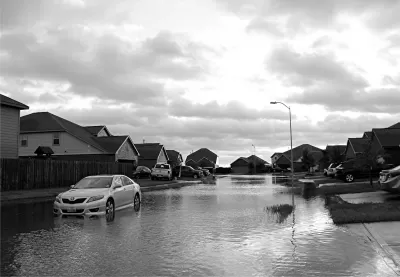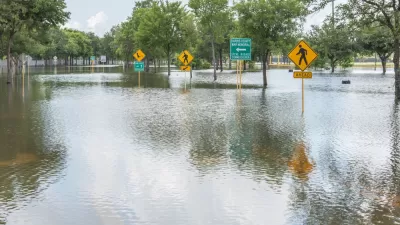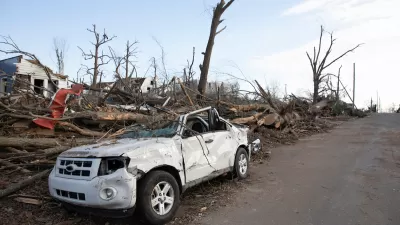The scale of the housing recovery effort means some jobs normally handles by FEMA have fallen to the Texas General Land Office.

In the aftermath of Hurricane Harvey, according to Brandon Formby of the Texas Tribune, "the Federal Emergency Management Agency worried that it didn’t have the capability to handle what was quickly becoming the largest housing recovery effort in American history."
"So [Texas Governor Greg] Abbott tasked the state’s General Land Office with a job that typically falls to FEMA: running short-term housing programs for Harvey victims. That undertaking includes everything from lining up contractors for minor repairs to securing trailers for displaced families."
Abbott has been criticized for waiting three weeks to employ the GLO for short-term housing, but "Abbott, Texas Land Commissioner George P. Bush and FEMA officials touted the unprecedented arrangement as a way to rewrite the nation’s disaster response playbook."
Since then, Formby writes, "initial public optimism has crashed against the reality of trying to re-engineer an already-byzantine process of getting disaster aid to hurricane survivors."
"The state-led plan was raising alarms from federal officials as well. The Department of Homeland Security’s Office of Inspector General said in a Sept. 29 'management alert' that because FEMA still hadn’t developed policies and procedures for the disaster recovery efforts, officials in hard-hit communities had been forced to develop housing plans themselves on a 'disaster-by-disaster basis.'"
In recent weeks, the federal government has promised a billion dollars for Harvey recovery by the first anniversary of the storm, with half of the money available right away.

Study: Maui’s Plan to Convert Vacation Rentals to Long-Term Housing Could Cause Nearly $1 Billion Economic Loss
The plan would reduce visitor accommodation by 25,% resulting in 1,900 jobs lost.

North Texas Transit Leaders Tout Benefits of TOD for Growing Region
At a summit focused on transit-oriented development, policymakers discussed how North Texas’ expanded light rail system can serve as a tool for economic growth.

Using Old Oil and Gas Wells for Green Energy Storage
Penn State researchers have found that repurposing abandoned oil and gas wells for geothermal-assisted compressed-air energy storage can boost efficiency, reduce environmental risks, and support clean energy and job transitions.

Santa Barbara Could Build Housing on County Land
County supervisors moved forward a proposal to build workforce housing on two county-owned parcels.

San Mateo Formally Opposes Freeway Project
The city council will send a letter to Caltrans urging the agency to reconsider a plan to expand the 101 through the city of San Mateo.

A Bronx Community Fights to Have its Voice Heard
After organizing and giving input for decades, the community around the Kingsbridge Armory might actually see it redeveloped — and they want to continue to have a say in how it goes.
Urban Design for Planners 1: Software Tools
This six-course series explores essential urban design concepts using open source software and equips planners with the tools they need to participate fully in the urban design process.
Planning for Universal Design
Learn the tools for implementing Universal Design in planning regulations.
Ascent Environmental
Borough of Carlisle
Institute for Housing and Urban Development Studies (IHS)
City of Grandview
Harvard GSD Executive Education
Toledo-Lucas County Plan Commissions
Salt Lake City
NYU Wagner Graduate School of Public Service





























